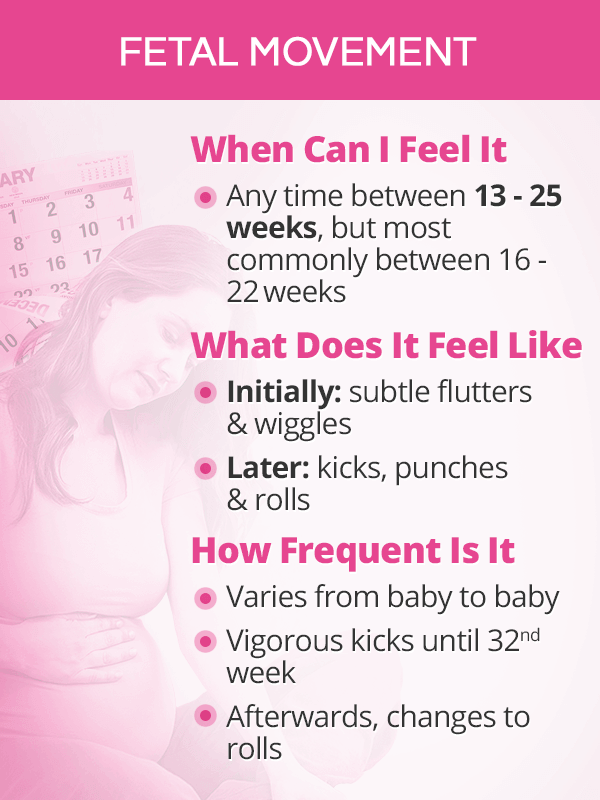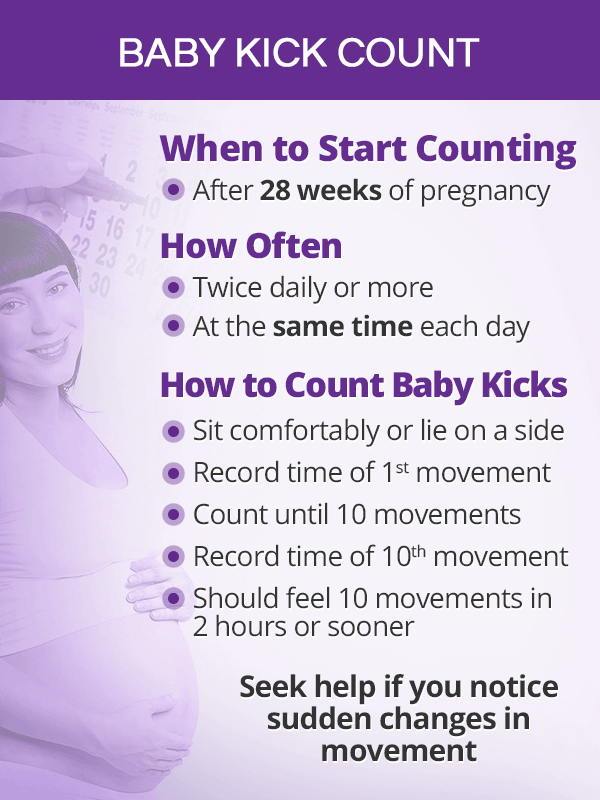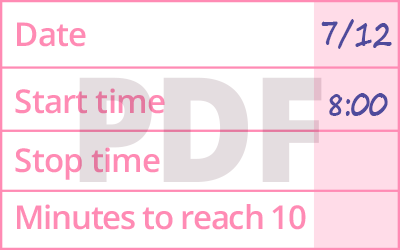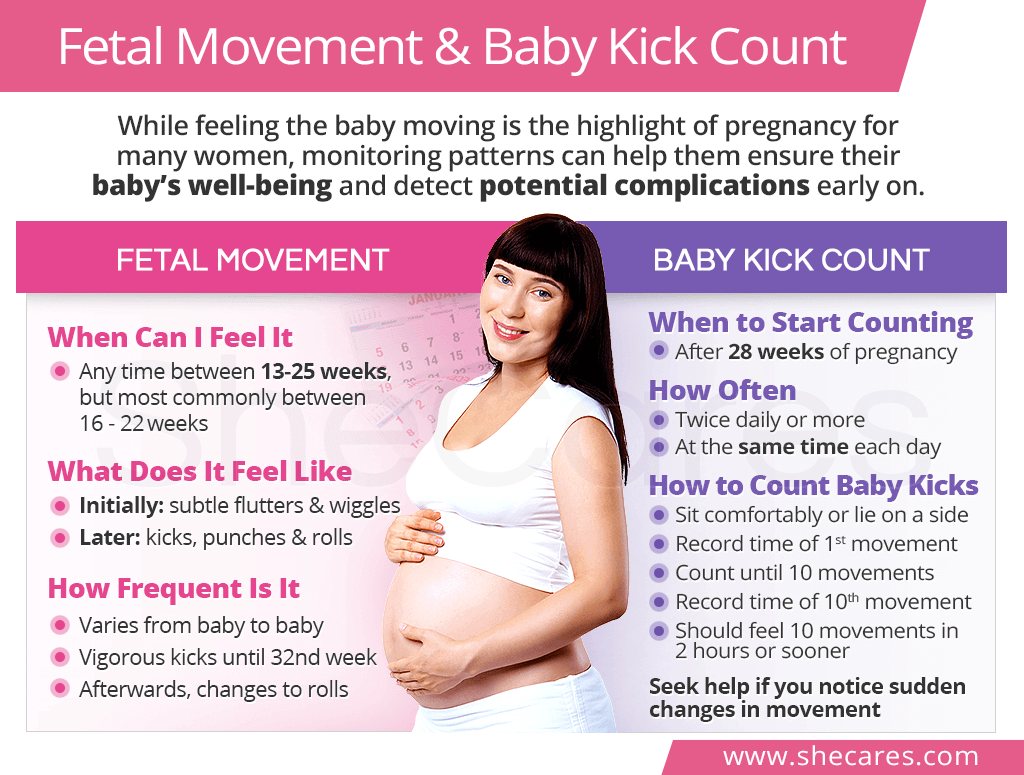Fetal Movement

Baby movements during pregnancy enable him or her to stretch the arms and legs and explore the surroundings, fueling brain development. His or her movement will also be a response to various stimuli from the outside as well as maternal habits, food she eats, and emotions she experiences.
When Does The Baby Start Moving
Although first baby movement can be observed on a prenatal ultrasound halfway through the first trimester, most women can detect the first subtle movement, called quickening, between the 16th and 22nd weeks1.
Those who have already had children in the past can often feel their baby moving in the womb as early as the 13th week, while first-time mothers might not be able to detect the movement until the 25th week2.
What Does Baby Movement Feel Like
Expectant mothers describe fetal movement in a variety of ways. Inititally, subtle flutters and wiggles might be easily confused with intestinal gas or hunger pangs, especially for those pregnant for the first time.
However, throughout subsequent stages of pregnancy, fetal kicks, punches, jabs, and rolls will grow more distinctive, recognizable, and vigorous.
How Often Should I Feel My Baby Move
The movement patterns vary from baby to baby. Generally, fetal kicks and punches follow an increasing pattern from their first detection until about the 32nd week of pregnancy3. From then onwards, the baby will have grown and filled the space in the womb, resulting in a change in movement's nature from kicking to rolling.
It is worth keeping in mind that the intensity and frequency of fetal movement does not lessen with the progression of pregnancy as babies continue moving until birth and throughout labor.
Increased or Decreased Fetal Movement
A mother-to-be often notices a slight increase or decrase in how her baby is moving in the belly in certain situations or times of the day, such as when she is going to sleep, after eating a sugary snack, or when she is under sudden stress.
While such irregularities in baby's movement in the second trimester are normal, more careful attention should be paid once a woman enters her third trimester. Increased or decreased fetal movement in the last three months of pregnancy are usually the first sign that the baby is in distress, necessitating prompt evaluation.
Monitoring Fetal Movement: Baby Kick Count

Maintaining a fetal movement count is not only important for early detection of potential pregnancy complications, such as stillbirth, but also has shown to be beneficial as bonding time between the mother and her unborn child4.
When Should I Start Counting Kicks
Women are recommended to start daily fetal kick counts after the 28th week of pregnancy and continue them until birth. In the case of high-risk pregnancy or multiple gestation, the counts are recommended starting at 26 weeks.
How Often Should I Count Baby Kicks
In the seventh and eighth months, it is recomemnded to count baby kicks two times a day, preferably once in the morning and once at night, which is when babies tend to be most active.
In the ninth month of pregnancy, a woman is encouraged to be more vigilant about her baby kick counts and do them several times a day. It is important to count at the same time each day as much as possible.
How to Count Baby's Kicks
The objective of fetal kick counts is simple: to determine how long it takes to feel 10 baby movements5. Most women detect the first 10 kicks, flutters, or rolls within 30 minutes, but it is normal for babies to take up to two hours.

To do a kick count, a woman should sit down in a comfortable position or lie on her left side. She will count the baby's movements until she felt all 10, while remembering to write down the following information:
- The exact time of the first movement
- The exact time of the tenth movement
The time between the two recorded times is how long the baby took to move 10 times, or her baby's kick count. By maintaining a daily kick count chart, a woman can quickly learn what is the norm for her baby and detect sudden changes.
When Should I Contact my Doctor?
Women who did not detect 10 movements in a 2-hour window are recommended to wait a few hours, lie on their left side, and do a baby kick count for two more hours. If 10 movements still are not felt, they should seek medical attention right away.
A doctor will most probably perform a non-stress test or biophysical profile (BPP), which are non-invasive types of prenatal tests aimed at assessing fetal health, including movement, heart rate, breathing, and other parameters. In some cases, a premature delivery might be a necessity.
Key Takeaways
Feeling the baby move in the belly can be equally a wonderful and scary experience as it can easily fill pregnant women with doubts whether their baby is kicking enough or maybe kicking too much. Most women recognize the first baby movements, called quickening, somewhere between weeks 16 to 22, although a normal time frame for their detection falls between the 13th and 25th weeks. Because a sudden, significant change in baby movement is often the first sign of distress, pregnant women are advised to do daily fetal kick counts from the 28th week onwards. It boils down to recording how long it takes for the baby to move 10 times, which should ideally take no more than two hours. This simple method of monitoring fetal movement can not only help detect abnormalities early on, but also create a unique bond between the mother and her growing baby.
Sources
- BMC Pregnancy and Childbirth. (2016). Fetal movement in late pregnancy - a content analysis of women's experiences of how their uborn baby moved less or differently. Retrieved August 13, 2019 from https://www.ncbi.nlm.nih.gov/pmc/articles/PMC4888620/
- Count the Kicks. (n.d.). How to Count Kicks. Retrieved August 13, 2019 from https://www.countthekicks.org/how-to-count-kicks/
- Journal of the Chinese Medical Association. (2018). A frequently asked question: Is it normal not to feel my baby's movements yet? Retrieved August 13, 2019 from https://www.sciencedirect.com/science/article/pii/S1726490117302794
- Kicks Count. (n.d.). Your baby's movements. Retrieved August 13, 2019 from https://www.kickscount.org.uk/your-babys-movements
- Medical Journal Armed Forces India. (2008). Daily Fetal Movement Count Chart: Reducing Perinatal Mortality in Low Risk Pregnancy. Retrieved August 13, 2019 from http://medind.nic.in/maa/t08/i3/maat08i3p212.pdf
- Scientific Reports. (2018). Developmental trajectory of movement-related cortical oscillations during actie sleep in a cross-sectional cohort of pre-term and full-term human infants. Retrieved August 13, 2019 from https://www.nature.com/articles/s41598-018-35850-1
- Queensland Health. (2018). Fetal Movements. Retrieved August 13, 2019 from https://www.health.qld.gov.au/__data/assets/pdf_file/0024/728700/sg-fetalmovement.pdf
Footnotes:
- StatPears. (2019). Fetal Movement. Retrieved August 13, 2019 from https://www.ncbi.nlm.nih.gov/books/NBK470566/
- American Pregnnacy Association. (2016). First Fetal Movement: Quickening. Retrieved August 13, 2019 from https://americanpregnancy.org/while-pregnant/first-fetal-movement/
- Royal College of Obstetricians & Gynaecologists. (2011). Reduced Fetal Movements. Retrieved August 13, 2019 from https://www.rcog.org.uk/globalassets/documents/guidelines/gtg_57.pdf
- Women and birth: Journal of the Australian College of Midwives. (2019). Beyond the headlines: Fetal movement awareness is an important stillbirth prevention strategy. Retrieved August 13, 2019 from https://www.ncbi.nlm.nih.gov/pubmed/30563769
- American Pregnancy Association. (2019). Kick Counts. Retrieved August 13, 2019 from https://americanpregnancy.org/while-pregnant/kick-counts/
